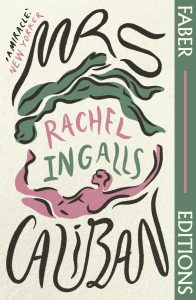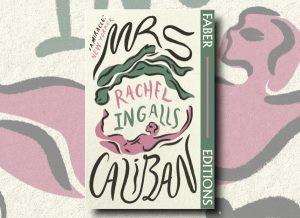MRS CALIBAN by Rachel Ingalls (BOOK REVIEW)
“You know it’s wonderful to see another world. It’s entirely unlike anything that has ever come to your thoughts. And everything in it fits. You couldn’t have dreamed it up yourself, but somehow it all seems to work, and each tiny part is related. Everything except me. If I had known I was only going to stay a short while, this would have been the most exciting thing I could imagine – a marvel in my life. But to know that it’s for ever, that I’ll always be here where I’m not able to belong, and that I’ll never be able to get back home, never…”
Rachel Ingalls’ Mrs Caliban (1982) is a gloriously strange novella. A dark feminist fairy tale that marries the domestic with the Weird, Ingall’s writings shows how the fantastic can enrich the literary and vice versa. The novella tells the story of the romance between depressed suburban housewife Dorothy and escaped fish monster Larry, in an oddly erotic mash-up of Hans Christian Andersen’s The Little Mermaid (1837) and B-movies like Creature From The Black Lagoon (1954). In its juxtaposition of its marginalised characters eking out an existence on the side-lines of American patriarchal society with humanity’s cruelty to those it deems less than human, it anticipates Guillermo del Toro’s Oscar winning film The Shape Of Water (2017). In the way it uses fairy tale motifs and subverts them to feminist ends it recalls Angela Carter’s contemporary deconstructions of the form in The Bloody Chamber (1979). But Ingalls’ masterful blending of the uncanny and the everyday remains very much her own, and nothing since has quite captured the novella’s distinctive feel. Reissued now by Faber Editions, Mrs Caliban should delight a new generation of fans of intelligent, literary fantasy and feminist literature.
 Dorothy’s life is falling apart. Her young son is dead, she has just lost a baby to a miscarriage, and her husband is cheating on her. Unable to face going through a divorce, she goes through the motions of her life, doing the housework whilst her husband is away, picking at the scabs of her unhappiness with her neighbour Estelle, dreading visits from her intolerable in-laws. All this changes when “Aquarius the Monsterman”, or Larry as he prefers to be called, disappears from the Jefferson Institute of Oceanographic Research and shows up in her kitchen. On the run from his own traumatic past, where he was captured from his home in the ocean, experimented on and abused by unscrupulous scientists, Larry is a kindred spirit to Dorothy, and the two embark on an affair that gives spark and meaning to Dorothy’s life again. But indulging Dorothy’s desires soon has darker consequences, and as the police close in on Larry, her fragile happiness begins to spiral out of control.
Dorothy’s life is falling apart. Her young son is dead, she has just lost a baby to a miscarriage, and her husband is cheating on her. Unable to face going through a divorce, she goes through the motions of her life, doing the housework whilst her husband is away, picking at the scabs of her unhappiness with her neighbour Estelle, dreading visits from her intolerable in-laws. All this changes when “Aquarius the Monsterman”, or Larry as he prefers to be called, disappears from the Jefferson Institute of Oceanographic Research and shows up in her kitchen. On the run from his own traumatic past, where he was captured from his home in the ocean, experimented on and abused by unscrupulous scientists, Larry is a kindred spirit to Dorothy, and the two embark on an affair that gives spark and meaning to Dorothy’s life again. But indulging Dorothy’s desires soon has darker consequences, and as the police close in on Larry, her fragile happiness begins to spiral out of control.
Mrs Caliban is a moving portrayal of two people recovering from trauma and grief, briefly finding what they need to heal within each other. The book explores the illicit eroticism of Dorothy’s forbidden affair with a monster, but the novella is far more concerned with how these two outsiders are able to fill the need created in each other by traumatic loss. Dorothy acts as Larry’s guide, helping him make sense of the alien world he finds himself in, whilst his child-like wonder at the world of humanity allows Dorothy to see the beauty in the world again. The story is full of moments of tenderness, with Larry doing things like helping Dorothy with the housework, something her emotionally absent husband would never even think of doing, or woman and fish monster watching TV together and pondering the nature of the human world in ways that have never occurred to Dorothy. For all Larry’s strangeness, there is a genuine sweetness to their relationship which makes it all the more painful when things start to go tragically wrong.
Through her outsider characters, Ingalls reflects on the limitations placed on Dorothy by the ideal of the suburban American housewife. Dorothy is frequently trapped by her role, denied meaningful agency in a way that echoes Larry’s incarceration at the research institute. Through her interactions with Larry, Dorothy finds herself more and more unsatisfied with the strictures of her life, and the various forces of patriarchal control exerted by society. The novella explores how the medical institutions act as a form of social control, from invasive procedures on Dorothy’s body without her consent to the patronising attitude of doctors who presume to know her body better than her, to the prescription of antidepressants as a way of regulating her behaviour. Similarly, Dorothy is expected to stay at home and look after the house, and prepare meals for her husband, whilst her husband is the one with a career and a life outside the home. Dorothy also notices the contempt with which her gardener Mr Mendoza is treated by the other suburban housewives, despite his expert knowledge of gardening, simply because he is working class and of Mexican descent. The common ground found between Larry the fish monster and Dorothy the human housewife makes her realise all the more starkly that all the differences society circumscribes between man and woman, middle class and working class, or people from different countries, is all so much fabricated nonsense.
Mrs Caliban’s unique tone is much of what sets it apart from other explorations of the fantastic and strange. The novella describes Larry’s intrusion into the world of Dorothy’s everyday domesticity with such matter-of-fact frankness that the reader can’t help but believe that this B movie monster is as much a part of reality as tedious social engagements and supermarkets. But the novel cunningly never quite lets the reader get comfortable with this mixture. Before she encounters Larry, Dorothy is starting to lose her grip on reality, hallucinating odd comforting voices on the radio breaking into her malaise and telling her that everything will be alright. When the announcer interrupts her radio programme to warn about the escaped creature, neither Dorothy or the reader is sure that this is not just another hallucination. Is Larry simply a further manifestation of Dorothy’s deteriorating mental health, brought on by stress, trauma and grief? This possibility hides in the shadows of the novel, growing more and more sinister as the results of Dorothy giving into her desire start to catch up with the rest of her life outside of Larry. Ingalls expertly rides this ambiguity, giving the story an extra edge of unease and discomfort.
Rachel Ingalls’ novella remains compelling and strange, and Faber’s reissue gives us a new chance to reassess Mrs Caliban as a powerful and unique contribution to the fantastic and the uncanny, as well as a key work of feminist literature. Dorothy and Larry’s story shows us how the fantastic can be a lens that allows us to look at our current reality in a fresh and subversive way, one that can amplify the experiences of those deemed outsiders by mainstream society. It is a joy to discover, and manages to achieve a depth of philosophy and characterisation in its short length that make it linger in the reader’s mind long after the final page.

